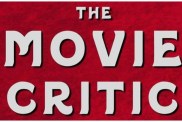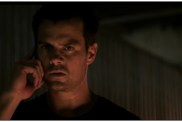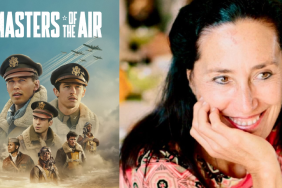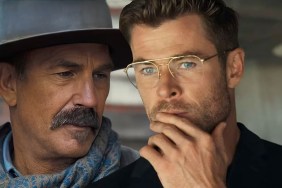For many years, filmmaker Susanne Bier has been one of Denmark’s finest exports with strong dramas like Open Hearts, Brothers and After the Wedding paving the way for her first foray to Hollywood with Halle Berry’s Things We Lost in the Fire. Although After the Wedding was nominated for a foreign language Oscar and Brothers was remade by Jim Sheridan into a drama starring Natalie Portman, Jake Gyllenhaal and Tobey Maguire.
Her latest movie In A Better World is another male-driven drama taking place in two very different worlds with characters facing life-changing issues. One story involves two boys, Christian and Elias, who fight back against a bully. Then the second story involves Elias’ father (Mikael Persbrandt), a doctor working in Africa who is going through a separation with his wife. While he’s used to treating the after-effects of the region’s violent warlord, he suddenly finds himself a victim of violence back home, something that Christian decides to take it into his own hands to get revenge.
Just days after Bier received her first Foreign Language Oscar for the movie, ComingSoon.net sat down with her in New York to talk about the film. As we talked, Bier remained curled up comfortably in her chair, but she kept her answers so blunt and to the point at times that we couldn’t really tell if the interview was going well at all, and she was particularly evasive when we asked about her upcoming project, a remake of the French thriller Rapt, which she and her frequent collaborator Anders Thomas Jensen are in the middle of writing, and her experiences with Hollywood.
ComingSoon.net: Last time we spoke, you mentioned that you and Anders are always setting out to write comedies whenever you start writing a new movie, so was that the case here as well?
Susanne Bier: No, actually this one wasn’t going to be a comedy. I think at that point… well, we have written a comedy but this one wasn’t meant to be a comedy. Actually, I think there’s quite comedic elements in many (of our) movies but they’re not comedies.
CS: When you two went off to start writing this, what was the idea that eventually turned into “In a Better World”?
Bier: I had started writing some scenes where some boys were being interrogated by the police and I really liked those scenes. It’s really hard to say, because in a way, we were working on a different story, and then, I read those scenes and I liked them, and then we kind of moved from there to here. We’d also talked about the fragility of the Danish ideal, so it was those two threads that sort of made this story come alive.
CS: The school aspect of the story is interesting to me, because bullying in school is something that happens but we don’t see a lot of movies about it. The recent Swedish thriller “Let the Right One In” also had that as a central subplot, so I was curious if that was a topic that was coming up a lot more in Scandinavia in recent years?
Bier: I think they’re just timely topics. I don’t know they are particularly Scandinavian. We did this before the whole big American vogue of dealing with bullying in schools and things like that, but I think in a way that there’s kind of a subconscious “timegeist” and I think we hit into that for some reason. We were kind of preoccupied with something that was already very prevalent.
CS: In America at least, we have a lot of things like shootings at schools, and we see more violence in schools, and I wondered if you had any insight into why that keeps growing.
Bier: I don’t know that there’s more bullying or whether it’s just more talked about. It seems to me that possibly that there’s been a lot of bullying all the time, but at the moment, it’s something that people are talking about.
CS: The movie starts off in Africa, and it’s your third or fourth movie where you have other countries juxtaposed with Denmark – you had India in “After the Wedding” and Afghanistan in “Brothers.” What is it about putting Danish people in these other places that interests you so much?
Bier: It’s many things. First, it’s that whole notion that we want to feel like the third world is away from us and doesn’t have to do with us, and that’s not true, it’s really part of our own world. That’s one of the things and secondly, I think it’s also like describing a character, actually with all characters, there is a character who is somehow in the Third World and wants to do all the right things, but has a hard time figuring out his own life. I find this is very contemporary, and you can say this movie in a way is about how difficult it is to be a decent human being in our time, and characters who are placed in that part of the world, in a way, feel almost self-assured in that part of the world and have a hard time coming back. I just find them incredibly interesting.

CS: Do you know people like that or have met people like that who have been in those situations?
Bier: Well, the thing is that I don’t necessarily make movies out of reality. I mean, I don’t make movies out of people I’ve met, but we have met, particularly for this movie, we had a lot of dealings with Doctors without Borders and spoke a lot with them, and some of the stories, like the story of Big Man, is actually built upon a real story.
CS: I was wondering about that, because you tend to have characters with very specific occupations such as the soldier in “Brothers,” so do you guys write the screenplay first and then go out and do research to support it?
Bier: No, we do research. Like with “Brothers,” I did have a lot to do with a special army service psychologist. I do research, and I do investigate, but I think there’s also like a highly exaggerated thing of research, which is why I do research, why I do get to know about it, and I do make sure that everybody in the crew who is involved in it knows all the things about it, but I also don’t want it to come instead of the drama or in front of the drama.
CS: There’s another layer to the story because you cast a Swedish actor as the doctor living in Denmark and his nationality actually plays a part in his confrontation later with the bully. I haven’t lived either in Sweden or Denmark, and it seems like the movie industries are interconnected where you have Swedish and Danish actors going back and forth. Is there some sort of underlying tension between the two nationalities despite all the intermingling?
Bier: No, that whole thing is not because there is a real antagonism between Swedes and the Danish, because there’s a very light-weight humorous thing, but that thing is there to show how stupid racism is. Okay, you’re racist against Swedes but they’re actually the same as you. This is showing in its core how idiotic racism is by nature.
CS: So there’s no hidden agenda implying that the Swedish man is a softer or more of a pacifist than Danish men?
Bier: No, no. Actually, it was written for a Dane and by choosing Mikael Persbrandt, I consciously chose someone with a lot of muscle, an actor with a lot of muscle and a distinct masculinity, so it’s not like saying “This is a soft Swedish guy.” He’s actually a tough Swedish guy.
CS: He’s used to playing tougher roles then and this is a different role for him?
Bier: Yes.
CS: I generally like the fact that you keep the cast fairly minimal, because I see so many American movies that are over-crowded with characters, but you and Anders have a way of having three to five characters and keeping it tight, and anyone else is just there briefly to interact. Is it a conscious thing while you’re writing to keep it very focused on as few characters as possible and you don’t feel the need for more?
Bier: I don’t think we deal with that, and I don’t think we say, “We’re not going to do many characters.” I don’t think you can divide movies into good or bad as to how many characters. I think you can divide movies into good or bad as to whether the audience are capable of maintaining a focus, but I can see us making a movie with more characters where you still have the focus. I quite like some of the movies that have many characters in them.
CS: Actually, I think you can attribute some of why your movies work so well to the smaller cast of interesting characters and that you remain focused on them. A lot of times, other characters are brought in just because the main characters aren’t as interesting as you’d want and you need to bring in others to make them more interesting. You really focus on the five characters and their interactions, and as you watch the movie, you assume there was more of a relationship between Christian’s father and Elias’ mother.
Bier: Did you assume they’re going to have a love affair?
CS: I think a lot of people might assume that and some might think that they already had something going and that Christian’s father may have been more involved with Elias’ parents separating? You imagine there’s more of a back story, which you don’t come out and reveal.
Bier: That’s interesting, that’s interesting.
CS: But you have nothing more to say about that?
Bier: Actually, at some point, we did consider that, but then we felt that it was a distraction from the story.

CS: That’s actually great that you avoided what would probably have been a cliché that most people would assume you were going that way, and I think a lot of filmmakers would have gone for the obvious route, because it would have added another element to the relationships.
Bier: Yeah, but the danger with adding extra elements is that you then diffuse what else is important, so it’s like a balance, but there were more scenes between them, but in editing, we pulled them out.
CS: Oh, you did. Do you generally write more than you actually shoot or end up with after the edit?
Bier: I generally edit quite heavily. In general, there aren’t many scenes that are sitting where they sat in the script in the final form. That doesn’t matter because if the script is strong, you can throw around scenes and they still work, but it’s not as if I edit a lot or (write scenes) that I don’t use, it’s just that I do feel… I’m not precious with my material. I’ll edit and I’ll make sure that an audience understands it, and then I’ll just pull out. I don’t allow myself to be in love with my material to a point where I can’t just throw it away.
CS: How does Anders feel about that? Is he precious at all about the screenplay he co-wrote?
Bier: I think he feels the same way. He’s not precious about his material at all.
CS: Because he also started directing himself, but he hasn’t directed in a while.
Bier: I think he’s going to do one this year.
CS: I was curious about that because a lot of writers who end up directing–obviously, not Anders because you two have such a great relationship–but a lot of time writers direct their own screenplays because they’re so frustrated…
Bier: By the way it comes out?
CS: More about having to turn over their baby and have as much say in the editing process.
Bier: Yeah, I don’t think he feels like that, but I just think he enjoys directing.
CS: I haven’t had a chance to interview him, because he doesn’t do a lot of press here. I want to talk about the two kids, because obviously, when you and Anders were writing a story that involved kids and you had to cast them, what was the process of finding these two young actors who are just amazing? Where did you find them?
Bier: The casting agent did an extensive auditioning, and she auditioned like 120 kids, and then the editor went over all the tapes, and then we found 12 kids that I then auditioned, but I knew that I wanted those two, and I kind of felt that they were sort of believable but not predictable friends. Also, I had at that point chosen the grown-up actors, and I kind of felt that they were so convincing as kids of the parents. It’s the first time that they did anything like that, so when they came in, I was really hoping that they were talented enough so that I could use them.
CS: How do you work with kids as a director when you need to put them in difficult situations but you also want to protect them from things kids normally shouldn’t have to deal with… like building bombs.
Bier: You can’t, you can’t. If they are 12, you can’t say, “Oh, just pretend that it’s about something else.” You have to be honest with them. You can’t have kids playing those kinds of parts and… they need to understand what it is about. You can’t protect them against it. In “Brothers,” that was very severe, because he goes crazy and one of the girls is really small. The only protection is when the director says, “Cut, it’s over. I mean, it’s fine, we’re playing here, it’s a movie,” but you can’t protect them otherwise, not the way I work.
CS: Did you do a lot of workshopping or rehearsing with the actors? Obviously, the adult actors are very experienced and can come in without much rehearsal, but do you have to do rehearsal with the kids?
Bier: I don’t do a lot of rehearsal. I don’t like rehearsals. I rehearse the day or morning. I spend one hour and a half with all the actors and we go over the scenes and we change it and change the dialogue and we do a lot of things to it, but prior to shooting, I don’t really rehearse.
CS: Did the kids spend any time with the respective actors playing their parents?
Bier: A little bit, a little bit, like they went to have coffee with them, but not in a… it’s not that I’m opposed to all this serious preparation. It’s just that I have not personally felt that it really made a difference.
CS: I also want to ask about the Danish title, because I noticed that it’s called “Haevnen.” Is that the Danish word for “heaven”?
Bier: No, it means revenge. It’s called “Haevnen” (pronounced completely different than we had pronounced it) and actually, I was never really keen on that title. I was so happy when I found the English title, but by the time it was coming out in Denmark, it had been too much in the press so we couldn’t change the Danish title, but I much prefer the English title. I much prefer the title that points to the sort of hopefulness of the movie rather than the severeness.

CS: It’s pretty crazy that the Danish word for “revenge” is spelled almost exactly like the English word for “heaven.”
Bier: Yeah, that’s right, but that’s not what it means.
CS: I remember from talking to you last time that you’re not a big fan easily giving away answers to what your movies mean and that you want your audiences to figure out those answers for themselves…
Bier: Oh, I want them to discuss the questions.
CS: With that in mind, is part of the idea of the movie that everyone is capable of violence, that regardless of how they try not to fight or talk through their problems, they still have the ability to be violent themselves?
Bier: I don’t think that’s the idea, no, and I don’t think that the idea is… I think the idea is… I mean, if you want to talk about that particular character, it’s more about everybody has a breaking point, which I think is true, but it’s more about being redeemable. You can say that the character of Christian is sort of the idea of the movie, that you have this very angry, hateful boy who is so pained, and he does evil things, and if he’s not being stopped, he would just go on doing really horrific things, but because of what happens and because he actually needs compassion–not just being saved physically but also being saved emotionally–there is hope for him.
CS: Do you think you’d want to do any more movies with kids after doing this?
Bier: Yeah, I could. I don’t know. I’m not opposed to, but I’m not planning on, “I’ve got to do more things with kids” either.
CS: I just think it’s an interesting idea because someone like Danny Boyle worked with kids in “Millions” and that led to him doing “Slumdog Millionaire.” I was surprised to hear that you’re working on a remake of sorts.
Bier: Yeah, we are working on the script.
CS: That’s really interesting, because I remember you telling me that when you found out some of your movies were being remade, it was very odd to you that it felt like “your babies were being adopted by someone else.” What was it about this material that made you want to do a remake yourself?
Bier: Here’s the thing, it is odd, and I did the film, but also I’m not opposed to it. I was worried before I was watching “Brothers” but I so much appreciated the performances, so I was very relieved. I find it flattering that apparently the stories have a universality that anybody would want to remake it.
CS: I’m not sure if it would be possible to adapt or remake “In a Better World” because it seems very specific and distinct.
Bier: I don’t know.
CS: Well, hopefully by now you also get to keep the rights to your movies so you can decide what happens with them.
Bier: Well, I think there’s also a tendency… winning the Golden Globe and winning the Oscar, I’m not sure that people will want to remake it. There’s a tendency for movies that have gotten less recognition would then be remade.
CS: What was it about this other movie “Rapt” that made you want to remake it?
Bier: It’s a good thriller. We’re working on the script and I can’t really say anything. Anders Thomas is writing the script and it’s in the middle of being written, so it’s vastly premature to talk about it.
CS: Are you a fan of the thriller genre though?
Bier: I love thrillers, yes.
CS: After you made “After the Wedding,” you made “Things We Lost in the Fire”–and I thought it was a great movie and loved it and thought it was one of Halle Berry’s best performances–so were you soured by the experience because the movie didn’t do that well?
Bier: No, I loved it. I had a great time doing it and I would happily do it again.
CS: After winning the Oscar, have you started getting a lot of meetings and people throwing scripts your way or do you feel you want to continue in this direction working with Anders and doing your own thing?
Bier: You do get a lot of interest after winning the Oscar, but I am in the midst of doing some things, which I’m quite excited about. I’m reading stuff and I’m quite interested to read stuff.
CS: But you and Anders have a pretty good track record with the films you’ve done together.
Bier: Yes, that’s right. We also have a lot of fun working together.
CS: Do you find it odd that Americans are still discovering your movies for the first time even though you’ve been making movies for 17 or 18 years?
Bier: (laughs) No, I find it kind of rewarding and actually, I find maybe it’s kind of healthy to be fairly confident and kind of relaxed about it, because I think I kind of understand how things work.
CS: Are there any older movies of yours that you’d like to have rediscovered by Americans from either before “Open Hearts” or…?
Bier: Nope.
In A Better World opens in New York and L.A. on Friday, April 1, and then will open in other cities later in the month.









